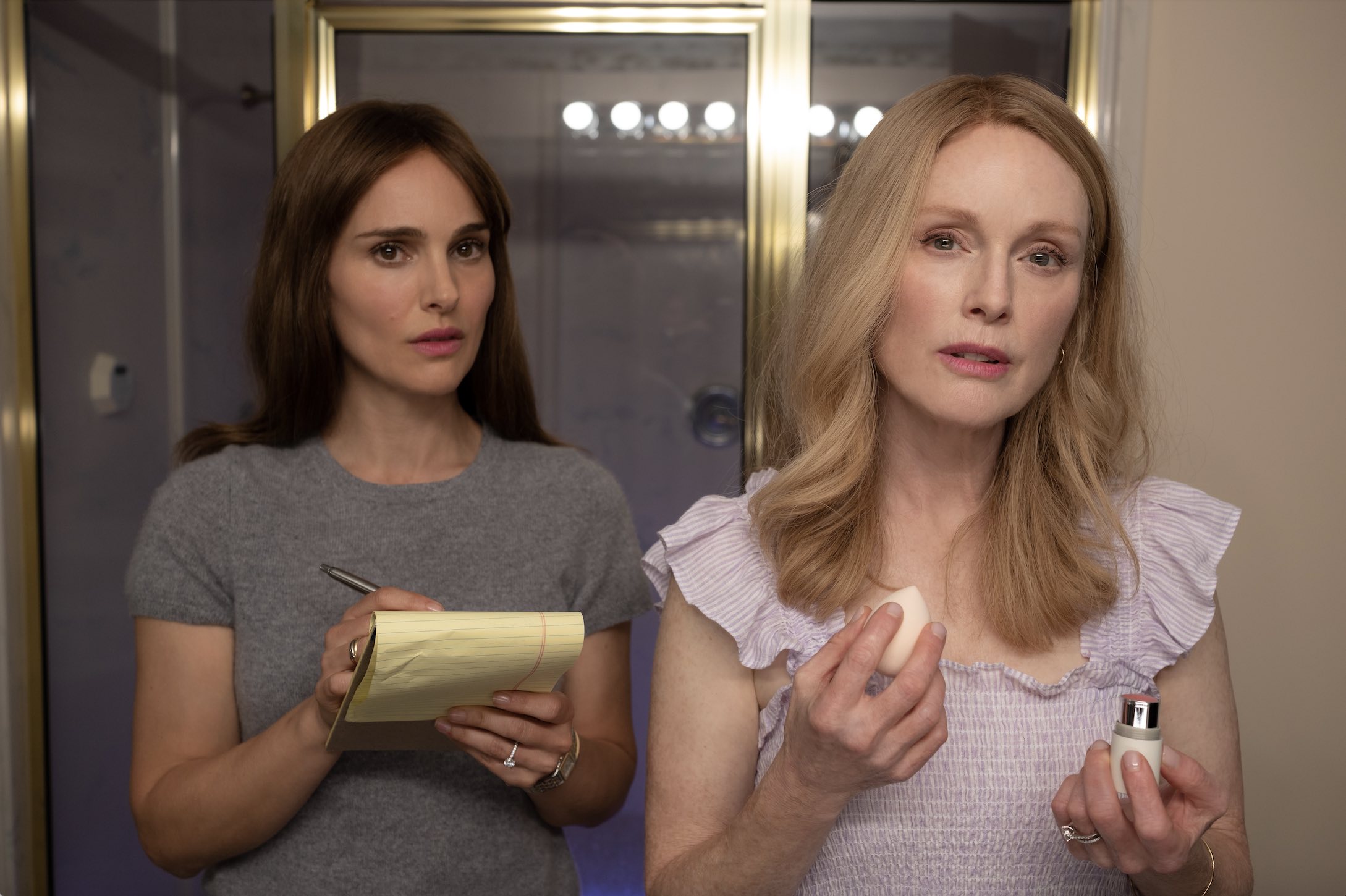Todd Haynes may seem like a highbrow filmmaker, but as a determined deconstructionist of American culture, he has to be broad-minded in his tastes. If "Safe" put his spin on the disease-of-the-week movie, "May December" offers his take on Lifetime specials and tabloid culture—or at least a meta consideration of how those formats, not to mention true-crime movies, come to be.
Natalie Portman stars as Elizabeth, an actress whose best-known role is in a hit TV show called "Norah's Ark." (The plot is only alluded to, but it sounds like Elizabeth plays some sort of super-veterinarian.) Now she's preparing to appear in a fact-based indie film, and so she travels to Savannah, Ga., to meet the woman she'll be playing. The woman is Gracie (Julianne Moore), and Haynes introduces her as a totally ordinary housewife getting ready to welcome Elizabeth at a barbecue.
Then the film, written by Samy Burch and Alex Mechanik, reveals exactly why Gracie has been deemed worthy of a motion picture: She is a Mary Kay Letourneau–like figure who, decades earlier, raped a seventh grader, went to prison, and upon release married her victim, Joe, who is now in his 30s (and played by Charles Melton). Gracie has superficially reintegrated into society; she's currently helping one of the daughters she had with Joe prepare to graduate from high school. But people still send her packages of excrement. Out of pity, locals buy the baked goods she sells. Her ex-husband (D.W. Moffett) and children from her previous marriage still live in the area, which makes for quite the community psychodrama.
Elizabeth wants to understand Gracie apart from the headlines and her cultural footprint. But is there anything to understand? Has Gracie herself, who seems to live without guilt, even understood what she's done and how it's affected her family? And if Elizabeth gets close to her—that is, begins to normalize her—is that a risky endeavor? Elizabeth is 36, the same age that Gracie was when she committed her crimes, and she grows to really like Joe. When she's doing research at the school, she takes questions from a drama class and gives a wildly inappropriate answer when asked about performing sex scenes. The line between playing a role and living it is one of the movie's subjects.
There are moments when "May December" threatens to turn into a Haynes version of "Persona" or, alternatively, something Brian De Palma might have directed circa 1984. The movie repurposes Michel Legrand's score from "The Go-Between" for an ominous atmosphere. The gauzy cinematography, by Christopher Blauvelt instead of Haynes's longtime collaborator Ed Lachman, appears to use 16-millimeter film.
To the extent that this is a movie about an actress in dogged pursuit of "realism," it is not terribly novel. But the character dynamics in "May" are queasily original. Watching Elizabeth play psychologist (or at least fake it) with Gracie and her family is fascinating, and it's deeply disquieting to watch the now-longtime-spouses Joe and Gracie negotiate the contours of their marriage. (Moore is nervous perfection in her role.) Haynes may have previously given us a miniseries version of "Mildred Pierce" and a Douglas Sirk pastiche, but he has never dared to depict domestic dysfunction on this scale.

The line that separates life and fictionalization is also the subject of the formidable "Anatomy of a Fall," directed by Justine Triet ("Sibyl"). The title is clearly a nod to Otto Preminger's "Anatomy of a Murder" (1959), perhaps the greatest of all courtroom thrillers, and inside a courtroom is where "Fall" spends much of its two-and-a-half-hour running time.
Sandra (Sandra Hüller) and Samuel (Samuel Theis) are a literary couple living in Samuel's hometown in the French Alps. But when their son, Daniel (Milo Machado Graner), returns from a walk, he finds Samuel's dead, bloody body in the snow—it appears that his father has fallen from the attic. There are three possibilities: The fall was a total accident. Samuel killed himself. Or Sandra murdered him.
It's for that last possibility that Sandra is charged. I'm not sure what the standard for convicting someone of homicide in France is, but if I were a juror, I would reach reasonable doubt on the physical evidence alone, and I choose to believe that's part of the point. A staggering—even exasperating—amount of the trial is spent trying to catch Sandra in lies about circumstantial evidence: a bruise on her arm, a fight she had with her husband, whether her writing foreshadowed the alleged crime, and so on. As a defendant, Sandra (and Hüller, performing in both English and French) makes for a much cooler customer than Pierre Goldman in "The Goldman Case," a French legal thriller shown here last week.
The key to the film is that it is not, in fact, an anatomy of a murder. It's an anatomy of a marriage, or specifically how a marriage has fallen apart. The trial functions as a fact-finding mechanism both for the court and for Daniel, who begins to understand his parents in a new way, or at least to understand—like Elizabeth in "May December"—how hard it is to understand. This is a dense, talky film with a complicated structure. Aspects that seemed superficial or implausible at the moment have only grown in my mind since it ended.
This afternoon Cannes Classics paid homage to Jean-Luc Godard, who died last year, with "Godard by Godard," a new hourlong documentary directed by Florence Platarets that contains the best collection of clips of Godard talking about his work—coherently, no less—that I have ever seen. It was followed by a previously unseen short Godard work that seems to have several different titles, but the subtitles called it "Trailer for 'Phony Wars' (Take One)." It was typically cryptic, as most of Godard's late work has been, and in some ways, it was closer to a slideshow than a short film. It consisted of a succession of still images—paintings, photographs, texts with Godard's epigrams and puns (e.g., "mais, 1968" instead of "Mai, 1968")—looking almost like postcards. The stills were often offset against a background of Canon photo paper.
I couldn't make much sense of it, but I only took heart from the idea that Godard, somehow, is still confounding audiences.












